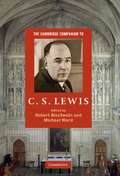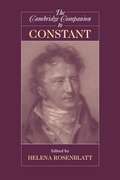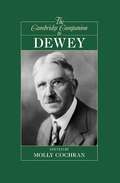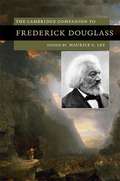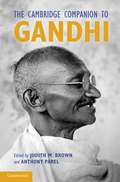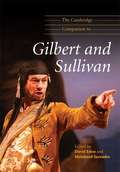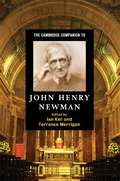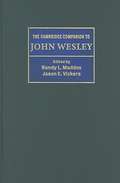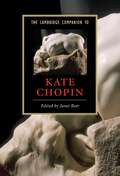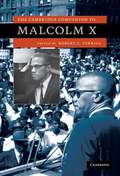- Table View
- List View
The Cambridge Companion to Byron
by Drummond BoneByron's life and work have fascinated readers around the world for two hundred years, but it is the complex interaction between his art and his politics, beliefs and sexuality that has attracted so many modern critics and students. In three sections devoted to the historical, textual and literary contexts of Byron's life and times, these specially commissioned essays by a range of eminent Byron scholars provide a compelling picture of the diversity of Byron's writings. The essays cover topics such as Byron's interest in the East, his relationship to the publishing world, his attitudes to gender, his use of Shakespeare and eighteenth-century literature, and his acute fit in a post-modernist world. This Companion provides an invaluable resource for students and scholars, including a chronology and a guide to further reading.
The Cambridge Companion to C.S. Lewis
by Robert Macswain Michael WardA distinguished academic, influential Christian apologist, and best-selling author of children's literature, C. S. Lewis is a controversial and enigmatic figure who continues to fascinate, fifty years after his death. This 2010 Companion is a comprehensive single-volume study written by an international team of scholars to survey Lewis's career as a literary historian, popular theologian, and creative writer. Twenty-one expert voices from Oxford, Cambridge, Princeton, and Wheaton, among many other places of learning, analyze Lewis's work from theological, philosophical, and literary perspectives. Some chapters consider his professional contribution to fields such as critical theory and intellectual history, while others assess his views on issues including moral knowledge, gender, prayer, war, love, suffering, and Scripture. The final chapters investigate his work as a writer of fiction and poetry. Original in its approach and unique in its scope, this Companion shows that C. S. Lewis was much more than merely the man behind Narnia.
The Cambridge Companion to Constant
by Helena RosenblattBenjamin Constant is widely regarded as a founding father of modern liberalism. The Cambridge Companion to Constant presents a collection of interpretive essays on the major aspects of his life and work by a panel of international scholars, offering a necessary overview for anyone who wants to better understand this important thinker. Separate sections are devoted to Constant as a political theorist and actor, his work as a social analyst and literary critic, and his accomplishments as a historian of religion. Themes covered range from Constant's views on modern liberty, progress, terror, and individualism, to his ideas on slavery and empire, literature, women, and the nature and importance of religion. The Cambridge Companion to Constant is a convenient and accessible guide to Constant and the most up-to-date scholarship on him.
The Cambridge Companion to Darwin
by Jonathan Hodge Gregory RadickThe naturalist and geologist Charles Darwin (1809-82) ranks as one of the most influential scientific thinkers of all time. In the nineteenth century his ideas about the history and diversity of life - including the evolutionary origin of humankind - contributed to major changes in the sciences, philosophy, social thought and religious belief. This volume provides the reader with clear, lively and balanced introductions to the most recent scholarship on Darwin and his intellectual legacies. A distinguished team of contributors examines Darwin's main scientific ideas and their development; Darwin's science in the context of its times; the influence of Darwinian thought in recent philosophical, social and religious debate; and the importance of Darwinian thought for the future of naturalist philosophy. New readers will find this a most convenient and accessible guide to Darwin. Advanced students and specialists will find a conspectus of recent developments in the interpretation of Darwin.
The Cambridge Companion to Dewey
by Molly CochranJohn Dewey (1859-1952) was a major figure of the American cultural and intellectual landscape in the first half of the twentieth century. While not the originator of American pragmatism, he was instrumental to its articulation as a philosophy and the spread of its influence beyond philosophy to other disciplines. His prolific writings encompass metaphysics, philosophy of mind, cognitive science, psychology, moral philosophy, the philosophies of religion, art, and education, and democratic political and international theory. The contributors to this Companion examine the wide range of Dewey's thought and provide a critical evaluation of his philosophy and its lasting influence, both elsewhere in philosophy and on other disciplines.
The Cambridge Companion to Dietrich Bonhoeffer
by John W. de GruchyThis Companion serves as a guide for readers wanting to explore the thought and legacy of the great German theologian Dietrich Bonhoeffer (1906-45). Its chapters, written by authors from differing national, theological and church contexts, provide an introduction to, and commentary on, Bonhoeffer's life and work, guiding the reader along the paths of his thought. Experts set out Bonhoeffer's political, social and cultural contexts, and offer biographical information that is indispensable for the understanding of his theology. There is a chronology and a glossary.
The Cambridge Companion to Duke Ellington
by Edward Green Evan SpringDuke Ellington is widely held to be the greatest jazz composer and one of the most significant cultural icons of the twentieth century. This comprehensive and accessible Companion is the first collection of essays to survey, in depth, Ellington's career, music, and place in popular culture. An international cast of authors includes renowned scholars, critics, composers, and jazz musicians. Organized in three parts, the Companion first sets Ellington's life and work in context, providing new information about his formative years, method of composing, interactions with other musicians, and activities abroad; its second part gives a complete artistic biography of Ellington; and the final section is a series of specific musical studies, including chapters on Ellington and song-writing, the jazz piano, descriptive music, and the blues. Featuring a chronology of the composer's life and major recordings, this book is essential reading for anyone with an interest in Ellington's enduring artistic legacy.
The Cambridge Companion to Einstein
by Michel Janssen Christoph LehnerThis volume is the first systematic presentation of the work of Albert Einstein, comprising fourteen essays by leading historians and philosophers of science that introduce readers to his work. Following an introduction that places Einstein's work in the context of his life and times, the book opens with essays on the papers of Einstein's 'miracle year', 1905, covering Brownian motion, light quanta, and special relativity, as well as his contributions to early quantum theory and the opposition to his light quantum hypothesis. Further essays relate Einstein's path to the general theory of relativity (1915) and the beginnings of two fields it spawned, relativistic cosmology and gravitational waves. Essays on Einstein's later years examine his unified field theory program and his critique of quantum mechanics. The closing essays explore the relation between Einstein's work and twentieth-century philosophy, as well as his political writings.
The Cambridge Companion to Francis of Assisi
by Michael J. P. RobsonFrancis of Assisi (1181/82-1226) was one of the most vibrant and colourful personalities in the Middle Ages. The life of this remarkable reformer of the medieval Church was celebrated in art, drama, poetry, music, the new vernacular literature and architecture. His ideal was to enter into a restorative and enriching relationship with Jesus Christ, whom he wished to imitate in the most perfect manner, a direct and immediate goal which captured the contemporary imagination. This Companion explores the life of Francis of Assisi and his enduring legacy throughout the centuries. The first part concentrates on his life and works whilst the second explores the way in which his heritage influenced the apostolic activities of his followers in the century following his death. This book is a must-read for students and scholars of Church history, as well as medieval social and intellectual history.
The Cambridge Companion to Frederick Douglass
by Maurice S. LeeFrederick Douglass was born a slave and lived to become a best-selling author and a leading figure of the abolitionist movement. A powerful orator and writer, Douglass provided a unique voice advocating human rights and freedom across the nineteenth century, and remains an important figure in the fight against racial injustice. This Companion, designed for students of American history and literature, includes essays from prominent scholars working in a range of disciplines. Key topics in Douglass studies - his abolitionist work, oratory, and autobiographical writings - are covered in depth, and new perspectives on religion, jurisprudence, the Civil War, romanticism, sentimentality, the Black press, and transatlanticism are offered. Accessible in style, and representing new approaches in literary and African-American studies, this book is both a lucid introduction and a contribution to existing scholarship.
The Cambridge Companion to Galileo
by Peter MachamerNot only a hero of the scientific revolution, but after his conflict with the church, a hero of science, Galileo is today rivalled in the popular imagination only by Newton and Einstein. But what did Galileo actually do, and what are the sources of the popular image we have of him? This collection of specially-commissioned essays is unparalleled in the depth of its coverage of all facets of Galileo's work. A particular feature of the volume is the treatment of Galileo's relationship with the church. It will be of interest to philosophers, historians of science, cultural historians and those in religious studies.
The Cambridge Companion to Gandhi
by Judith M. Brown Anthony ParelEven today, six decades after his assassination in January 1948, Mahatma Gandhi is still revered as the father of the Indian nation. His intellectual and moral legacy, and the example of his life and politics, serve as an inspiration to human rights and peace movements, political activists and students. This book, comprised of essays by renowned experts in the fields of Indian history and philosophy, traces Gandhi's extraordinary story. The first part of the book explores his transformation from a small-town lawyer during his early life in South Africa into a skilled political activist and leader of civil resistance in India. The second part is devoted to Gandhi's key writings and his thinking on a broad range of topics, including religion, conflict, politics and social relations. The final part reflects on Gandhi's image and on his legacy in India, the West, and beyond.
The Cambridge Companion to Gilbert and Sullivan
by David Eden Meinhard SarembaMemorable melodies and fanciful worlds - the comic operas of Gilbert and Sullivan remain as popular today as when they were first performed. This Companion provides a timely guide to the history and development of the collaboration between the two men, including a fresh examination of the many myths and half-truths surrounding their relationship. Written by an international team of specialists, the volume features a personal account from film director Mike Leigh on his connection with the Savoy Operas and the creation of his film Topsy-Turvy. Starting with the early history of the operatic stage in Britain, the Companion places the operas in their theatrical and musical context, investigating the amateur performing tradition, providing new perspectives on the famous patter songs and analysing their dramatic and operatic potential. Perfect for enthusiasts, performers and students of Gilbert and Sullivan's enduring work, the book examines their legacy and looks forward to the future.
The Cambridge Companion to Hegel and Nineteenth-Century Philosophy
by Frederick C. BeiserThe Cambridge Companion to Hegel and Nineteenth-Century Philosophy examines Hegel within his broader historical and philosophical contexts. Covering all major aspects of Hegel's philosophy, the volume provides an introduction to his logic, epistemology, philosophy of mind, social and political philosophy, philosophy of nature and aesthetics. It includes essays by an internationally recognised team of Hegel scholars. The volume begins with Terry Pinkard's article on Hegel's life, a conspectus of his biography on Hegel. It also explores some topics much neglected in Hegel scholarship: such as Hegel's hermeneutics and relationship to mysticism. Aimed at students and scholars of Hegel, this volume will be essential reading for anyone interested in nineteenth-century philosophy. The bibliography includes the most important English-language literature on Hegel written in the last fifteen years.
The Cambridge Companion to John Calvin
by Donald K. MckimAn international array of major Calvin scholars considers aspects of Calvin's theological thought and influence. Historians as well as theologians present the major themes in his writings in addition to discussing the ways in which his thought spread and has increasing importance today.
The Cambridge Companion to John Henry Newman
by Ian Ker Terrence MerriganJohn Henry Newman (1801-90) was a major figure in nineteenth-century religious history. He was one of the major protagonists of the Oxford or Tractarian Movement within the Church of England whose influence continues to be felt within Anglicanism. A high-profile convert to Catholicism, he was an important commentator on Vatican I and is often called 'the Father' of the Second Vatican Council. Newman's thinking highlights and anticipates the central themes of modern theology including hermeneutics, the importance of historical-critical research, the relationship between theology and literature, and the reinterpretation of the nature of faith. His work is characterised by two elements that have come especially to the fore in post-modern theology, namely, the importance of the religious imagination and the fiduciary character of all knowledge. This Companion fills a need for an accessible, comprehensive and systematic presentation of the major themes in Newman's work.
The Cambridge Companion to John Ruskin (Cambridge Companions to Literature)
by Francis O’gormanJDescription Contents Resources Courses About the Authors John Ruskin (1819–1900), one of the leading literary, aesthetic and intellectual figures of the middle and late Victorian period, and a significant influence on writers from Tolstoy to Proust, has established his claim as a major writer of English prose. This collection of essays brings together leading experts from a wide range of disciplines to analyse his ideas in the context of his life and work. Topics include Ruskin's Europe, architecture, technology, autobiography, art, gender, and his rich influence even in the contemporary world. This is the first multi-authored expert collection to assess the totality of Ruskin's achievement and to open up the deep coherence of a troubled but dazzling mind. A chronology and guide to further reading contribute to the usefulness of the volume for students and scholars. Draws together experts from a range of disciplines and contexts to explore John Ruskin's diversity as a polymathic thinker and writer The first multi-authored expert collection to survey the totality of Ruskin's achievement Topics include Ruskin's Europe, architecture, technology, gender, autobiography, art, and his rich influence and relevance
The Cambridge Companion to John Wesley
by Randy L. Maddox Jason E. VickersA leading figure in the Evangelical Revival in eighteenth-century England, John Wesley (1703-1791) is the founding father of Methodism and, by extension, of the holiness and Pentecostal movements. This Cambridge Companion offers a general, comprehensive introduction to Wesley's life and work, and to his theological and ecclesiastical legacy. Written from various disciplinary perspectives, including history, literature, theology, and religious studies, this volume will be an invaluable aid to scholars and students, including those encountering the work and thought of Wesley for the first time.
The Cambridge Companion to Jonathan Edwards
by Stephen J. SteinLong recognized as 'America's theologian', Jonathan Edwards (1703-1758) is seen as instrumental in the Great Awakening of the 1740s that gripped much of New England and that laid the groundwork for an American Protestant religious identity. This Cambridge Companion offers a general, comprehensive introduction to Jonathan Edwards and examines his life and works from various disciplinary perspectives including history, literature, theology, religious studies, and philosophy. The book consists of seventeen chapters written by leading religious scholars, historians and literary critics on Edwards' life, work, and legacy. The Companion will be an invaluable aid to teachers and scholars and will be imminently accessible to those just encountering Edwards for the first time.
The Cambridge Companion to Kafka
by Julian PreeceFranz Kafka's writing has had a wide-reaching influence on European literature, culture and thought. The Cambridge Companion to Kafka, offers a comprehensive account of his life and work, providing a rounded contemporary appraisal of Central Europe's most distinctive Modernist. Contributions cover all the key texts, and discuss Kafka's writing in a variety of critical contexts such as feminism, deconstruction, psycho-analysis, Marxism, Jewish studies. Other chapters discuss his impact on popular culture and film. The essays are well supported by supplementary material including a chronology of the period and detailed guides to further reading, and will be of interest to students of German, European and Comparative Literature, Jewish Studies.
The Cambridge Companion to Kate Chopin
by Janet BeerAlthough she enjoyed only modest success during her lifetime, Kate Chopin is now recognised as a unique voice in American literature. Her seminal novel, The Awakening, published in 1899, explored new and startling territory, and stunned readers with its frank depiction of the limits of marriage and motherhood. Chopin's aesthetic tastes and cultural influences were drawn from both the European and American traditions, and her manipulation of her 'foreignness' contributed to the composition of a complex voice that was strikingly different to that of her contemporaries. The essays in this Companion treat a wide range of Chopin's stories and novels, drawing her relationship with other writers, genres and literary developments, and pay close attention to the transatlantic dimension of her work. The result is a collection that brings a fresh perspective to Chopin's writing, one that will appeal to researchers and students of American, nineteenth-century, and feminist literature.
The Cambridge Companion to Keynes
by Roger E. Backhouse Bradley W. BatemanJohn Maynard Keynes (1883-1946) was the most important economist of the twentieth century. He was also a philosopher who wrote on ethics and the theory of probability and was a central figure in the Bloomsbury Group of writers and artists. In this volume contributors from a wide range of disciplines offer new interpretations of Keynes's thought, explain the links between Keynes's philosophy and his economics, and place his work and Keynesianism - the economic theory, the principles of economic policy, and the political philosophy - in their historical context. Chapter topics include Keynes's philosophical engagement with G. E. Moore and Franz Brentano, his correspondence, the role of his General Theory in the creation of modern macroeconomics, and the many meanings of Keynesianism. New readers will find this the most convenient, accessible guide to Keynes currently available. Advanced students and specialists will find a conspectus of recent developments in the interpretation of Keynes.
The Cambridge Companion to Lucretius
by Stuart Gillespie Philip HardieLucretius' didactic poem De rerum natura ('On the Nature of Things') is an impassioned and visionary presentation of the materialist philosophy of Epicurus, and one of the most powerful poetic texts of antiquity. After its rediscovery in 1417 it became a controversial and seminal work in successive phases of literary history, the history of science, and the Enlightenment. In this 2007 Cambridge Companion experts in the history of literature, philosophy and science discuss the poem in its ancient contexts and in its reception both as a literary text and as a vehicle for progressive ideas. The Companion is designed both as an accessible handbook for the general reader who wishes to learn about Lucretius, and as a series of stimulating essays for students of classical antiquity and its reception. It is completely accessible to the reader who has only read Lucretius in translation.
The Cambridge Companion to Maimonides
by Kenneth SeeskinOne aim of this series is to dispel the intimidation readers feel when faced with the work of difficult and challenging thinkers. Moses ben Maimon, also known as Maimonides (1138-1204), represents the high point of Jewish rationalism in the middle ages. He played a pivotal role in the transition of philosophy from the Islamic East to the Christian West. His greatest philosophical work, The Guide of the Perplexed, had a decisive impact on all subsequent Jewish thought and is still the subject of intense scholarly debate. An enigmatic figure, Maimonides continues to defy simple attempts at classification. The twelve essays in this volume offer a lucid and comprehensive treatment of his life and thought. They cover the sources on which Maimonides drew, his contributions to philosophy, theology, jurisprudence, and Bible commentary, as well as his esoteric writing style and influence on later thinkers.
The Cambridge Companion to Malcolm X
by Robert E. TerrillMalcolm X is one of the most important figures in the twentieth-century struggle for equality in America. With the passing of time, and changing attitudes to race and religion in American society, the significance of a public figure like Malcolm X continues to evolve and to challenge. This 2010 Companion presents new perspectives on Malcolm X's life and legacy in a series of specially commissioned essays by prominent scholars from a range of disciplines. As a result, this is an unusually rich analysis of this important African American leader, orator, and cultural icon. Intended as a source of information on his life, career and influence and as an innovative substantive scholarly contribution in its own right, the book also includes an introduction, a chronology of the life of Malcolm X, and a select bibliography.

